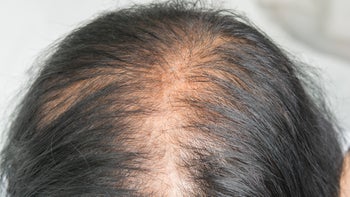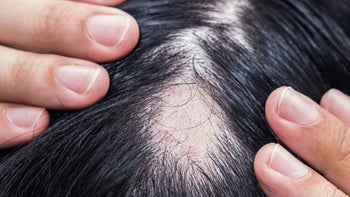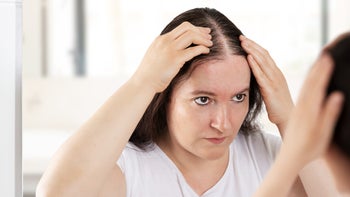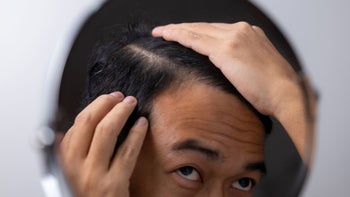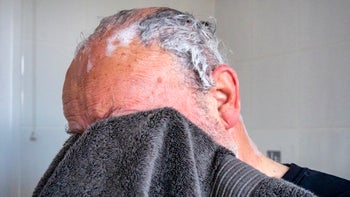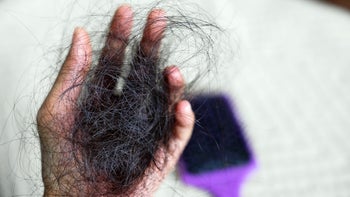
Which Hair Loss Treatment Is Right for You? Best Treatments and Medications
Key takeaways:
The best hair loss treatment depends on the cause.
Treatments for hair loss include over-the-counter and prescription medications, as well as some procedures. Supplements may help if you have a vitamin deficiency.
Hair loss can be a sign of an underlying medical issue, so it’s important to see your primary care provider or a dermatologist for help.
Access savings on related medications
Table of contents
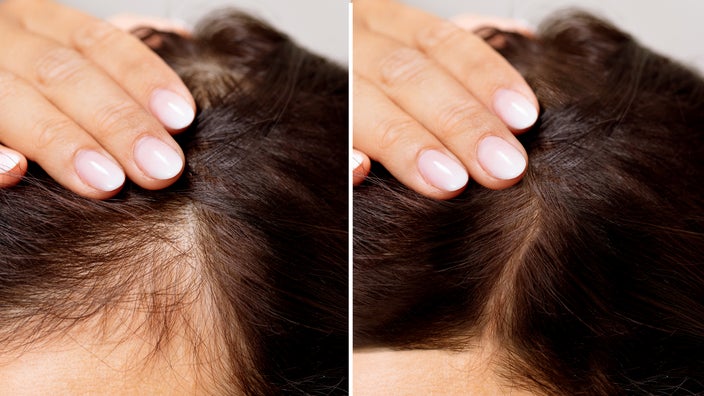
Hair is one of the most unique tools for self-expression. Hair is also a cultural symbol, and people have a deep relationship with it. It’s also functional, because it protects people from the sun and keeps them warm. So there are many reasons why it can be difficult to experience hair loss, for men or women.
The good news is that there are several treatment options available. Here we’ll review common and effective treatments, as well as the evidence behind common hair loss supplements.
What causes hair loss?
There are many causes for hair loss. Some common ones include:
Genetics
Stress (telogen effluvium)
Hormonal changes
Vitamin or iron deficiency
Search and compare options
What are the best hair loss treatments for men and women?
The best treatment for hair loss depends on the cause. Most hair loss (like female- and male-pattern baldness) is nonscarring, which means hair is more likely to grow back with treatment.
Scarring hair loss (like chronic traction alopecia) is more likely to be permanent because the hair follicles are scarred over. This type of hair loss is more difficult to treat, especially if it’s not caught early. This is true for both men and women. Scarring hair loss is often treated with prescription medications that help manage inflammation. These include hydroxychloroquine, corticosteroids, and doxycycline.
Here are some of the best treatments available for nonscarring hair loss.
Finasteride (Propecia)
Finasteride is a daily medication that you take by mouth. It requires a prescription. Studies show that it can significantly improve hair loss and reverse some hair thinning in men.
Finasteride isn’t FDA approved for use in women and may cause birth defects in pregnant women. But it’s sometimes used “off-label” to treat age-related and other types of hair loss in women.
Minoxidil (Rogaine)
Minoxidil is available over the counter (OTC) in two strengths (2% and 5%) and different formulations, like liquid, foam, and spray. It’s FDA approved to treat scalp hair loss in women and men. Experts aren’t entirely sure how it works, but it probably dilates (opens) blood vessels, which lets more blood flow to the hair follicles.
How long do hair loss medications take to work? It can take several months to see results, but it depends on the specific treatment.
What does a hair transplant feel like? Three men describe why they decided to get this procedure done and how their recovery went.
Natural remedies for hair loss: Some people might be hesitant to try medications for hair loss. These natural remedies might help support hair health, but note that research is lacking.
Minoxidil is also available as a prescription pill and is used off-label for people who have side effects with topical use. Studies suggest the pill is as effective as applying the medication directly to the scalp.
Hair transplants
This is a popular way to reverse hair loss. There are two main types of hair transplants:
Follicular unit transplantation involves removing a strip of hair from the back of the head.
Follicular unit extraction involves transplanting individual hair follicles.
Extraction is less likely to cause scarring than transplantation. New hair usually begins growing between 6 and 9 months, and it may take 12 to 15 months to see full results. Insurance doesn’t cover hair transplants.
Platelet-rich plasma (PRP)
Platelet-rich plasma (PRP) is a newer therapy for hair loss. In this procedure, a sample of your blood is spun in a machine. This separates PRP from the rest of the blood. The PRP is then injected into your scalp. It’s rich in growth factors, which are thought to stimulate hair growth.
Research suggests that monthly PRP treatments for 3 months can stimulate hair growth. Insurance doesn’t cover it.
Microneedling
Microneedling involves injecting small needles into the skin under pressure. It’s often used for cosmetic purposes to stimulate collagen production and reduce wrinkles. Microneedling also stimulates stem cells in the hair follicle and promotes growth.
Microneedling is often combined with other treatments, including PRP and minoxidil. But one study suggests it can improve hair growth more than minoxidil alone. Insurance doesn’t cover microneedling.
Triamcinolone steroid injections
Triamcinolone steroid injections into the scalp can help regrow hair. A medical professional can perform these injections at regular intervals until hair starts regrowing. This method can be used to treat nonscarring hair loss due to alopecia areata and different scarring alopecias. Insurance may cover this type of treatment based on your individual case.
Does taking hair loss medication come with risks?
Yes, all prescription medications and treatments have risks. The same is true for hair loss treatments.
These are some more common risks to consider before starting treatment for hair loss:
Post-finasteride syndrome: In men, finasteride has been reported to lower libido (sex drive) and cause erectile dysfunction. It has also been linked with depression and suicide.
Hair shedding: Topical liquid or foam minoxidil can cause some hair shedding for the first few months of treatment. This hair will grow back. But it can be disheartening to lose hair with a treatment that’s supposed to help regrow hair.
Infection: Any procedure that involves needles and is used for hair growth (like PRP) has a risk of infection.
Scarring: Hair transplants may cause scalp scarring and infection. And there’s also the risk that you may not achieve the results you were hoping for.
Which supplements can treat hair loss?
If you’re not ready for prescription medications or procedures yet, you may be wondering what else you can try. Some OTC supplements may help you regrow your hair, but the research behind them isn’t robust.
It’s best to speak with a medical professional before starting any supplements. If you think you have a nutritional deficiency, it’s best to get tested first. Taking excessive amounts of supplements may do more harm than good.
Here’s what studies show about different supplements for hair loss.
Collagen
Collagen supplements can help improve skin hydration and elasticity. They have also become popular for hair growth. But there are no clinical trials studying collagen’s effects on hair. Taking oral collagen supplements doesn’t appear to have any negative risks.
Biotin (vitamin B7)
Biotin is a long-standing supplement for hair loss. But there’s no conclusive data that biotin helps regrow hair. A 2024 literature review found no good evidence that it works.
It’s also important to note that biotin supplements can interfere with certain blood tests, leading to incorrect results. As such, the FDA has issued a warning about biotin supplementation. Be sure to let your healthcare team know if you’re taking biotin.
Vitamin D
Studies show that people with alopecia areata have lower levels of vitamin D than those who don’t have it. But there’s not much research to support vitamin D supplementation for hair loss. It might help when taken in combination with other medication, but more research is needed.
Zinc
Severe zinc deficiency can be a trigger for hair loss. Infants fed on milk formula, people who consume excessive amounts of alcohol, and people with malnutrition are at risk for zinc deficiency. Zinc supplementation can help treat zinc deficiency and regrow hair, but there’s not much evidence to support its use in people without deficiency.
Iron
An iron deficiency can contribute to hair loss. There are different possible causes for iron deficiency, and your primary care provider can help you get to the bottom of things. If you have low iron, supplementation may be helpful in regrowing your hair.
Can you naturally regrow hair loss?
It really depends on the cause. Some types of hair loss can go away on their own, and eventually the hair grows back. An example of this is hair loss caused by stress (telogen effluvium).
Other types of hair loss need medical treatment for the hair loss, or for the underlying medical condition that may be causing it.
That said, there’s a link between scalp health and hair growth. So, in addition to other treatments, natural treatments aimed at supporting scalp health may help support hair regrowth.
People have tried a range of strategies with this idea. There isn’t a whole lot of good evidence for any of these, but they’re very unlikely to harm you. Some natural remedies to promote hair growth include:
Scalp massage
Essential oils, like peppermint and rosemary
Jojoba and coconut oil
Melatonin applied to the scalp
Caffeine shampoos
When should you see a dermatologist?
Hair loss can be a sign of a problem inside your body. For example, hormonal imbalances — such as those in polycystic ovary syndrome (PCOS) and hypothyroidism — can lead to hair loss.
An early evaluation by a dermatologist can help find the cause of your hair loss. A dermatologist can examine your hair and order tests to make sure a serious cause for your hair loss isn’t missed. Knowing the cause of your hair loss can help speed up treatment and hair regrowth.
Frequently asked questions
There’s a lot of conflicting evidence regarding vitamin and mineral deficiencies and hair loss. But deficiencies in the following are linked to hair loss:
Vitamin D
Vitamin B
Iron
Zinc
It’s a good idea to talk with a healthcare professional before starting any supplements. Overdoing it with some vitamins can actually lead to hair loss.
Eating foods with protein, biotin, iron, and healthy fats might help support hair growth. There’s not a ton of research to back this up, but a balanced and nutritious diet never hurts anyone. Examples include:
Fatty fish
Oysters
Eggs
Spinach
Avocados
The bottom line
Hair loss is common in both men and women. Treatments range from medications like minoxidil to procedures such as platelet-rich plasma injections. In some situations, supplements like collagen, vitamin D, iron, and zinc may also help you regrow your hair. A dermatologist can help you figure out which type of hair loss you have and discuss the best treatment options for you.
Why trust our experts?



References
Almohana, H. M., et al. (2018). The role of vitamins and minerals in hair loss: A review. Dermatology and Therapy.
American Academy of Dermatology Association. (n.d.). A hair transplant can give you permanent, natural-looking results.
Gade, V. K. V., et al. (2018). An investigation of vitamin D status in alopecia areata. Clinical and Experimental Medicine.
Gupta, A. K., et al. (2019). The efficacy of platelet-rich plasma in the field of hair restoration and facial aesthetics — A systematic review and meta-analysis. Journal of Cutaneous Medicine and Surgery.
Gupta, A. K., et al. (2022). Finasteride for hair loss: A review. Journal of Dermatological Treatment.
Gupta, A. K., et al. (2022). Microneedling for hair loss. Journal of Cosmetic Dermatology.
Hassan, G. F. R., et al. (2022). Treatment with oral vitamin D alone, topical minoxidil, or combination of both in patients with female pattern hair loss: A comparative clinical and dermoscopic study. Journal of Clinical Dermatology.
Inoue, N., et al. (2016). Ingestion of bioactive collagen hydrolysates enhance facial skin moisture and elasticity and reduce facial ageing signs in a randomised double-blind placebo-controlled clinical study. Journal of the Science of Food and Agriculture.
Randolph, M., et al. (2021). Oral minoxidil treatment for hair loss: A review of efficacy and safety. Journal of the American Academy of Dermatology.
Saini, K., et al. (2021). Role of vitamin D in hair loss: A short review. Journal of Cosmetic Dermatology.
Sharma, R., et al. (2019). Follicular unit extraction (FUE) hair transplant: Curves ahead. Journal of Maxillofacial and Oral Surgery.
U.S. Food and Drug Administration. (2019). Update: The FDA warns that biotin may interfere with lab tests: FDA safety communication.
Yelich, A., et al. (2024). Biotin for hair loss: Teasing out the evidence. Journal of Clinical and Aesthetic Dermatology.


